Transcript
I think probably the first time that is vividly in my memory, it was actually coming home from school one night. And a sort of elderly gentleman got knocked over by a cyclist on a middle of a kind of really, really busy road just opposite the bus station, and cut his head and was bleeding quite a lot from his scalp. And I suppose I particularly remember that because it was during the ambulance – there was a strike going on for ambulance drivers, paramedics, you know, the London Ambulance Service were on strike. And so there was quite a lot of anxiety around, about, you know, who was going to come. I think a mixture of police and the army were like covering the ambulance services. And yeah, obviously I didn’t have a First Aid kit on me, I had my schoolbag. And so I had to improvise what was around me, which was my coat and yeah, I just remember kind of going, well, this, you know, I’ve been trained for this, I’ve got to go and help, and I did. And I hope that he was okay. I suppose what they – I probably, you know, that’s the thing as a First-Aider, is you don’t necessarily get any follow-up unless it’s somebody that you know. And I think that’s happened a few times over the years, where I’ve helped, you know, somebody in the public and then they’ve maybe gone off to hospital and you actually have no idea what happens after that because they don’t, you know, the ambulance doesn’t take your details or anything like that. They maybe more now check whether you’ve done anything that you shouldn’t do, like moving someone I think, something like that. But if you haven’t then that’s it. But the, um, I suppose the, apart from the fact that quite a few of my school colleagues, whatever, had seen me and therefore they reported it back to teachers and so I got a call-out, a sort of congratulatory call-out in assembly the following week that I’d stopped and helped.
The other really strong memory is the fact that the police van that turned up to, you know, as a supplementary ambulance just had a, you know, a wheelie stretcher in the back, sort of shoved in the back of the police van. And when they opened the back doors there was a loo roll just sitting on the top. It was just – it felt so not like the London Ambulance Service. And they came out and the policeman who was covering was shaking way more than I was ’cos obviously his adrenaline was going. And he, you know, probably had only had really basic First Aid training and had no idea what he was doing and he was untangling this bandage and getting it all over the place. And, you know, I must have been maybe thirteen and I was sort of, you know, had to kind of just go, like, do you want me to do the bandage? And give me another one, that’s not sterile any more, and that kind of thing. So yeah, it – obviously those kinds of things stay in your memory, as well as the actual First Aid.


